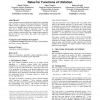GECCO
2005
Springer
13 years 11 months ago
2005
Springer
Using a dynamic systems model for the Simple Genetic Algorithm due to Vose[1], we analyze the fixed point behavior of the model without crossover applied to functions of unitation...
GECCO
2005
Springer
13 years 11 months ago
2005
Springer
In neuroevolution, a genetic algorithm is used to evolve a neural network to perform a particular task. The standard approach is to evolve a population over a number of generation...
GECCO
2005
Springer
13 years 11 months ago
2005
Springer
Genetic Algorithms (GAs) are very commonly used as function optimizers, basically due to their search capability. A number of different serial and parallel versions of GA exist. ...
GECCO
2005
Springer
13 years 11 months ago
2005
Springer
We propose a method for applying genetic algorithms to create 3D terrain data sets. Existing procedural algorithms for generation of terrain have several shortcomings. The most po...
GECCO
2005
Springer
13 years 11 months ago
2005
Springer
Genetic Algorithms (GAs) are a search and optimization technique based on the mechanism of evolution. Recently, another sort of population-based optimization method called Estimat...
GECCO
2005
Springer
13 years 11 months ago
2005
Springer
Ongoing research has established a new methodology for using genetic algorithms [2] to evolve forward and inverse transforms that significantly reduce quantization error in recons...
GECCO
2005
Springer
13 years 11 months ago
2005
Springer
This paper describes a genetic algorithm (GA) that evolves optimized sets of coefficients for one-dimensional signal reconstruction under lossy conditions due to quantization. Beg...
GECCO
2005
Springer
13 years 11 months ago
2005
Springer
We propose three distance measures for genetic search space. One is a distance measure in the population space that is useful for understanding the working mechanism of genetic al...
GECCO
2005
Springer
13 years 11 months ago
2005
Springer
We study if and when the inequality dp(H) ≤ rel∆(H) holds for schemas H in chromosomes that are structured as trees. The disruption probability dp(H) is the probability that a...
GECCO
2005
Springer
13 years 11 months ago
2005
Springer
This paper examines a real-world application of genetic algorithms – solving the United States Navy’s Sailor Assignment Problem (SAP). The SAP is a complex assignment problem ...





